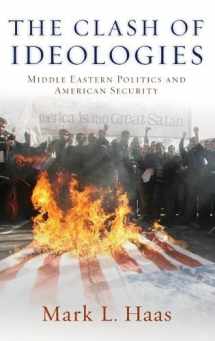
The Clash of Ideologies: Middle Eastern Politics and American Security
ISBN-13:
9780199838424
ISBN-10:
0199838429
Edition:
1
Author:
Mark L. Haas
Publication date:
2012
Publisher:
Oxford University Press
Format:
Hardcover
320 pages
FREE US shipping
Book details
ISBN-13:
9780199838424
ISBN-10:
0199838429
Edition:
1
Author:
Mark L. Haas
Publication date:
2012
Publisher:
Oxford University Press
Format:
Hardcover
320 pages
Summary
The Clash of Ideologies: Middle Eastern Politics and American Security (ISBN-13: 9780199838424 and ISBN-10: 0199838429), written by authors
Mark L. Haas, was published by Oxford University Press in 2012.
With an overall rating of 3.8 stars, it's a notable title among other
books. You can easily purchase or rent The Clash of Ideologies: Middle Eastern Politics and American Security (Hardcover) from BooksRun,
along with many other new and used
books
and textbooks.
And, if you're looking to sell your copy, our current buyback offer is $0.5.
Description
How do ideologies shape international relations in general and Middle Eastern countries' relations with the United States in particular? The Clash of Ideologies by Mark L. Haas explores this critical question. Haas argues that leaders' ideological beliefs are likely to have profound effects on these individuals' perceptions of international threats. These threat perceptions, in turn, shape leaders' core security policies, including choices of allies and enemies and efforts to spread their ideological principles abroad as a key means of advancing their interests. Two variables are particularly important in this process: the degree of ideological differences dividing different groups of decision makers ("ideological distance"), and the number of prominent ideologies that are present in a particular system ("ideological polarity"). The argument is tested in four case studies of states' foreign policies, primarily since the end of the Cold War: Iran, Saudi Arabia, Syria, and Turkey. As the argument predicts, ideological differences in these cases were a key cause of international conflict and ideological similarities a source of cooperation. Moreover, different ideological groups in the same country at the same time often possessed very different understandings of their threat environments, and thus very different foreign policy preferences. These are findings that other prominent international relations theories, particularly realism, cannot explain. Clash of Ideologies goes beyond advancing theoretical debates in the international relations literature. It also aims to provide policy guidance on key international security issues. These prescriptions are designed to advance America's interests in the Middle East in particular, namely how U.S. leaders should best respond to the ideological dynamics that exist in the region.


We would LOVE it if you could help us and other readers by reviewing the book
Book review

Congratulations! We have received your book review.
{user}
{createdAt}
by {truncated_author}


